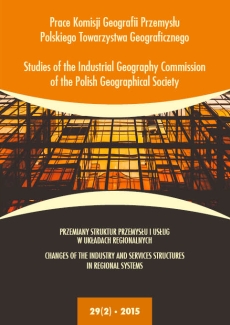Spatial Diversity of High-Tech Industry and Knowledge-Intensive Services
DOI:
https://doi.org/10.24917/20801653.292.4Keywords:
economy, high tech industries, knowledge intensive services, employmentAbstract
The processes of knowledge production and diffusion play a special role in contemporary economies. Their high share is typical for high-tech industries and knowledge-intensive services. The goal of the article is to present their spatial diversity in Central and Eastern Europe, with special attention focused on employment changes. Research period covers the years 2000-2013. The considerations in the article were conducted in the following areas: 1) high-tech industries and knowledge-intensive services determinants of development, 2) the analysis of high-tech industries development, 3) employment changes in KIS, especially high-tech KIS. Changes in Poland are in line with the direction of the changes taking place in developed countries, however their dynamics seems to be insufficient. That is why the development of high-tech sectors should be treated as a priority in Polish economy. There is no doubt that the use of appropriate instruments of economic policy, especially fiscal, as well as expansion of technology platforms, would contribute to their development and, consequently, the modernization of the Polish economy. It should be stressed that such actions are important not only because of high-tech sectors development, but also due to the absorption of the high-quality labor force.
Downloads
Metrics
References
Aiginger, K., Sieber, S. (2005). Towards a Renewal Industrial Policy in Europe. Project Lead HannesLeo. WIFO. Pozyskano z: http://karl.aiginger.wifo.ac.at/.
Bettencourt, L.A., Ostrom, A.L., Brown, S.W., Roundtree, R.I. (2002). Client Co-Production in Knowledge-Intensive Business Services. California Management Review, 44, 100–128.
Bianchi, P., Labory, S. (2011). Industrial Policy after the Crisis. Seizing the Future. Cheltenham: Edward Elgar Publishing.
European Commission (2002). Communication of 11 December 2002 on: Industrial Policy in an enlarged Europe. COM(2002) 714 final.
European Commission (2012). Communication from the Commission to the Eurpean parliament, theCouncils, the Eurpean Economic and Social Comittee and the Comittee of the Regions. A Stronger European Industry for Growth and Economic Recovery. COM (2012), 582 final.
Eurostat (2014, 10 listopada). Pozyskano z http://epp.eurostat.ec.europa.eu/ (zakładki Statistics,Database: Data Navigation Tree: Science and technology).
Gurbała, M. (2010). Przemysł high-tech a poziom rozwoju społeczno-gospodarczego krajów. PraceKomisji Geografii Przemysłu Polskiego Towarzystwa Geograficznego, 13, 187–199. Hryniewicz, J.T. (2013). Przemysł, gospodarka oparta ma wiedzy i wspólna europejska polityka przemysłowa. Prace Komisji Geografii Przemysłu Polskiego Towarzystwa Geograficznego, 21, 32–45.
Kuusisto, J., Viljamaa, A. (2004). Knowledge-Intensive Business Services and Coproduction ofKnowledge – the Role of Public Sector? Frontiers of E-business Research, 282–290.
Miles, I., Kastrinos, N., Bilderbeek, R., den Hertog, P. (1995). Knowledge-Intensive Business Services –Users, Carriers and Sources of Innovation. EIMS publication, 15. The University of Manchester. Nauka i technika w 2012 r. (2013). Informacje i opracowania statystyczne. Warszawa: GUS.
Nycz, G. (2013). Nowa gospodarka w Polsce po transformacji systemowej – problemy węzłowe. PraceKomisji Geografii Przemysłu Polskiego Towarzystwa Geograficznego, 22, 11–22.
Raczyk, A., Dobrowolska-Kaniewska, H. (2009). Kształtowanie struktur przestrzennych sektora przemysłu i usług według poziomów techniki na przykładzie województwa dolnośląskiego. Prace Komisji Geografii Przemysłu Polskiego Towarzystwa Geograficznego, 13, 42–53.
Rubalcaba, L. (2007). The New Services Economy. Challenges and Policy Implications for Europe. Cheltenham: Edward Elgar, 128–130.
Sektor nowoczesnych usług biznesowych w Polsce 2014. (2014). Raport przygotowany przez Związek Liderów Sektora Usług Biznesowych ABSL. Warszawa: ABSL.
Skórska, A. (2012). Wiedzochłonne usługi biznesowe w Polsce i innych krajach Unii Europejskiej. Katowice: Wydawnictwo Uniwersytetu Ekonomicznego w Katowicach.
Skórska, A. (2013). Ocena poziomu rozwoju GOW w Polsce w ujęciu sektorowym oraz według Knowledge Assesement Methodology. W: E. Kwiatkowski, W. Kasperkiewicz (red.), Gospodarka w okresie globalnego kryzysu, Acta Universitatis Lodziensis 281, Folia Oeconomica. Łódź: Wydawnictwo Uniwersytetu Łódzkiego, 279–294.
Zioło, Z. (2013). Rola przemysłu i usług w kształtowaniu. gospodarki opartej na wiedzy. Prace Komisji Geografii Przemysłu Polskiego Towarzystwa Geograficznego, 21, 11–30.
Downloads
Published
How to Cite
Issue
Section
License
Articles are published under the terms of the Creative Commons License (CC BY-ND 4.0; Attribution– NoDerivs).

